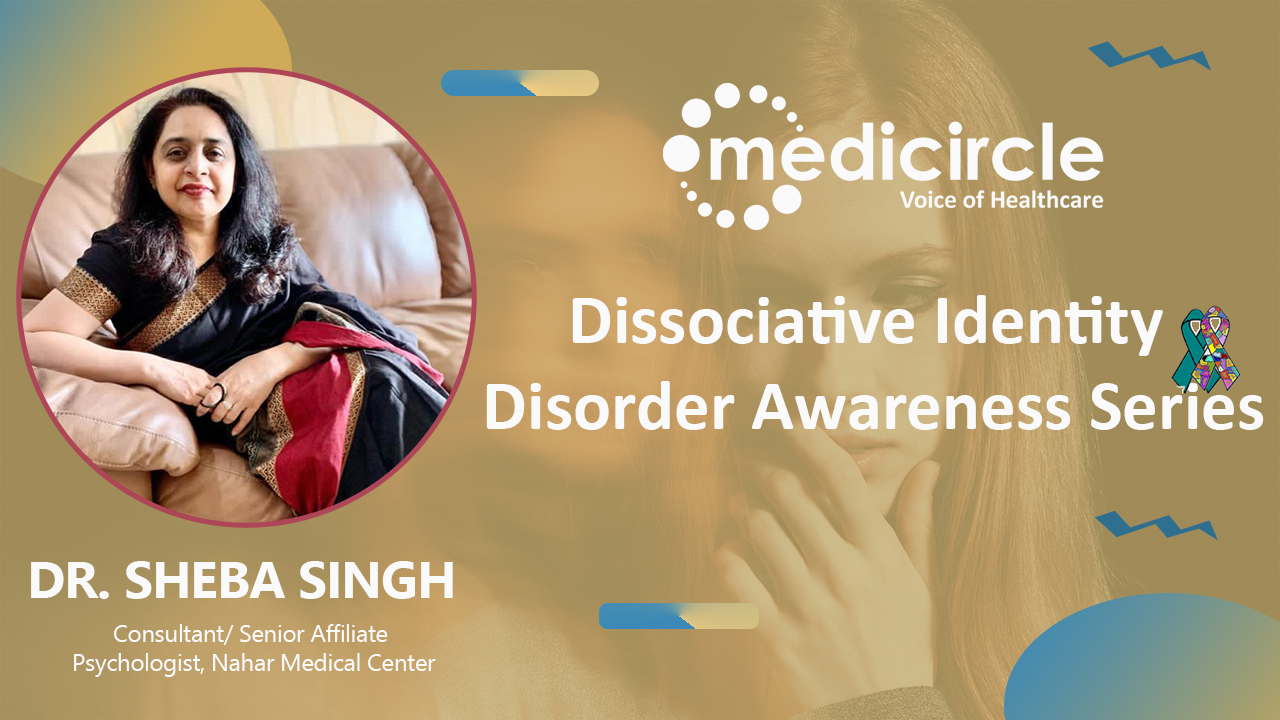Dissociative Identity Disorder was formerly called multiple personality disorder. It often goes unnoticed among the general population. Those who suffer from this disorder lead a terrifying and disturbing life. Medicircle presents an exclusive series on Dissociative Identity Disorder so that people get to understand this disorder directly from the experts. Dissociative Identity Disorder Awareness Day is observed each year in March. It aims to spread awareness of this disorder's existence and create understanding and compassion towards the people who are suffering from it.
Dr. Sheba Singh is a Clinical Psychologist and Mental Health Consultant. She has done her doctorate in psychology after winning a gold medal in her post-graduation. She has diverse experience in academy and social endeavours and has a practice of close to a couple of decades. She has many research papers to her credit, which have been published in different journals of Psychology. She is an avid speaker at conferences and seminars. She has conducted many workshops on anxiety, depression, relaxation techniques, parenting, bullying, basic counselling, skills in practice, etc. She has also been invited to TV shows as a parenting expert. She has mentored and supervised many graduates and postgraduates in psychology and many students have interned under her. Currently, she practices in Mumbai and is a senior affiliate with one of India's leading Employee Assistance Programs – EAP.
Insights on Dissociation and why DID is a Stress-Based Disorder
Dr. Sheba mentions, “Since we are talking about Dissociative Identity Disorder, I want to start with the word “dissociation”. The literal meaning of dissociation is disconnection. So, here we are talking about a disconnection with the self, with memory with consciousness. What causes this is a coping mechanism. Though it is not a very good coping mechanism, this is how we cope with the stresses, specifically the ones which a child gets during childhood in the form of sexual abuse, physical abuse, emotional abuse, or any other traumatic accident. So, this is a stress-based disorder."
Identify Triggers of Dissociation and Get Rid of Stress From it
Dr. Sheba advises, “First of all, an individual has to identify one’s stresses by maybe writing down a journal on his stresses or his triggers, which takes him/her into another personality and leads to dissociation. So, when one identifies the triggers, he/she would get to know what to avoid. Then, because it's a stress-based disorder, one has to get rid of the stress by ways like exercise, some relaxation techniques, maybe some deep breathing, progressive muscle relaxation, yoga etc. to get relieved from stress."
Support is Important
Dr. Sheba informs, “A person experiencing dissociation can get support from family, friends, support groups etc. People who are in a similar situation and suffering from dissociative identity disorder can also help each other. And finally, if the individual is not able to cope with it, he/she can go for psychotherapy. That's the only treatment for dissociative identity disorder. Maybe they can go in for some medicine also later. But then medicine is not for dissociative identity disorder, it can be for associated disorders like depression, etc.,” says Dr. Sheba.
Prevention of Dissociative Identity Disorder in Children
Dr. Sheba explains, “People who resist stress may not have DID. So, it depends from person to person, individual to individual. Not everybody reacts in the same manner. Not every child who experiences stress in childhood would have DID. When we are dealing with children, because DID is a major stressor from childhood, so, primarily the prevention may involve giving a stress-free environment to the child and not having an authoritative parenting style.”
People Suffering from Dissociative Identity Disorder are not Harmful
Dr. Sheba informs, “A person who has an alter personality may be angry as a normal person is angry. But then he/she would not harm anybody like that. Rather they harm themselves. There are high chances of suicidal tendencies in dissociative identity disorder patients."
Caregivers of People Suffering from DID need to help themselves first
Dr. Sheba emphasizes, “It’s just like an air hostess, saying that you put on your oxygen mask first and then help others. So, I would say that the caregivers need to help themselves first. They need to first take care of their physical and mental health because it's very exhausting to see a friend or family member going through an alter personality. There is a lot of trauma that one gets. It needs a lot of patience. That's why caregivers should put on their guards first and then help relatives or friends suffering from DID. The caregivers need to identify the triggers and keep those away from the sufferer for e.g. a particular smell could be a trigger for someone and that needs to be kept at bay from the sufferer and help him/her avoid that."
(Edited by Amrita Priya)

 Caregivers of People Suffering from Dissociative Identity Disorder Should Take Care of Themselves First to Cope Up with -the Trauma, advises Dr. Sheba Singh, Clinical Psychologist.
Caregivers of People Suffering from Dissociative Identity Disorder Should Take Care of Themselves First to Cope Up with -the Trauma, advises Dr. Sheba Singh, Clinical Psychologist.










.jpeg)




.jpeg)

.jpg)













